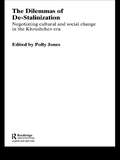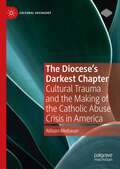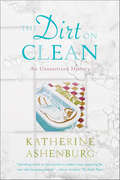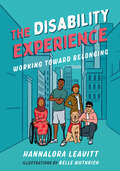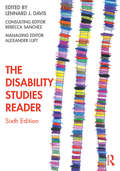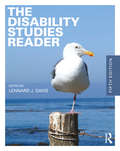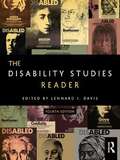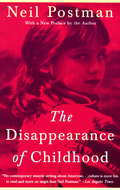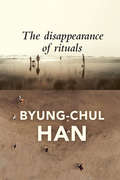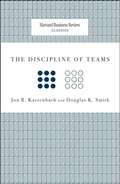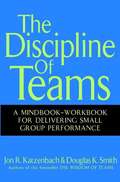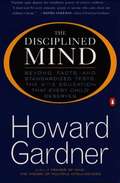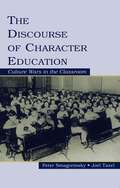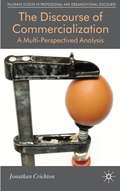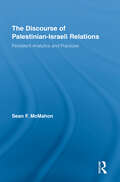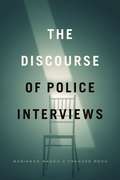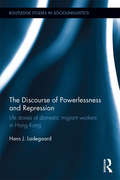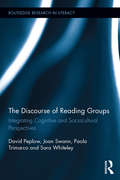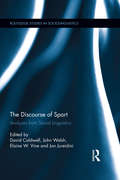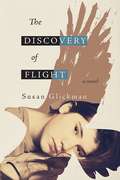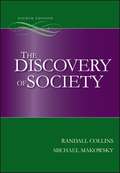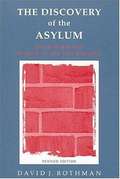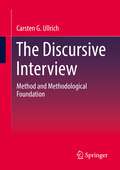- Table View
- List View
The Dilemmas of De-Stalinization: Negotiating Cultural and Social Change in the Khrushchev Era (BASEES/Routledge Series on Russian and East European Studies #Vol. 23)
by Polly JonesThe Khrushchev era is increasingly seen as a period in its own right, and not just as 'post-Stalinism' or a forerunner of subsequent 'thaws' and 'reform from within'. This book provides a comprehensive history of reform in the period, focusing especially on social and cultural developments. Since the opening of the former Soviet archives, much new information has become available casting light on how far official policies correlated with popular views. Overall the book appraises how far 'Destalinization' went; and whether developments in the period represented a real desire for reform, or rather an attempt to fortify the Soviet system, but on different lines.
The Diocese's Darkest Chapter: Cultural Trauma and the Making of the Catholic Abuse Crisis in America (Cultural Sociology)
by Allison NiebauerFrom its quiet inception in 1988, to a hailstorm of statewide and national controversy over thirty years later, this book follows the development of public discourse regarding a clergy sexual abuse scandal in a small Catholic Diocese in Central Pennsylvania. Weaving together the evolving local and national narratives, it offers a striking account of how stakeholder rhetoric has influenced public perception of the Catholic abuse crisis in America, and driven public actions. While the book enriches our local knowledge of the tragic--and ongoing--cultural trauma triggered by the revelation of clergy perpetrated abuse in a small Catholic Diocese, it also makes a critical theoretical contribution to our understanding of the role of rhetoric in publicizing private pain, and galvanizing collectives to take it on as their own. The process of cultural trauma, Niebauer contends, unfolds through rhetorical forms that provide individuals with a constraining and enabling set of rhetorical choices. Highlighting the recurrent rhetorical forms of narration, kategoria, apologia, and topoi, The Diocese's Darkest Chapter brings a new vocabulary and explanatory force to the study of cultural trauma, and the Catholic abuse crisis in America.
The Dirt on Clean: An Unsanitized History
by Katherine AshenburgA spirited chronicle of the West's ambivalent relationship with dirt The question of cleanliness is one every age and culture has answered with confidence. For the first-century Roman, being clean meant a two-hour soak in baths of various temperatures, scraping the body with a miniature rake, and a final application of oil. For the aristocratic Frenchman in the seventeenth century, it meant changing your shirt once a day and perhaps going so far as to dip your hands in some water. Did Napoleon know something we didn't when he wrote Josephine "I will return in five days. Stop washing"? And why is the German term Warmduscher—a man who washes in warm or hot water—invariably a slight against his masculinity? Katherine Ashenburg takes on such fascinating questions as these in Dirt on Clean, her charming tour of attitudes to hygiene through time.What could be more routine than taking up soap and water and washing yourself? And yet cleanliness, or the lack of it, is intimately connected to ideas as large as spirituality and sexuality, and historical events that include plagues, the Civil War, and the discovery of germs. An engrossing fusion of erudition and anecdote, Dirt on Clean considers the bizarre prescriptions of history's doctors, the hygienic peccadilloes of great authors, and the historic twists and turns that have brought us to a place Ashenburg considers hedonistic yet oversanitized.
The Disability Experience: Working Toward Belonging (Orca Issues #5)
by Hannalora LeavittPeople with disabilities (PWDs) have the same aspirations for their lives as you do for yours. The difference is that PWDs don’t have the same access to education, employment, housing, transportation and healthcare in order to achieve their goals. In The Disability Experience you’ll meet people with different kinds of disabilities, and you'll begin to understand the ways PWDs have been ignored, reviled and marginalized throughout history. The book also celebrates the triumphs and achievements of PWDs and shares the powerful stories of those who have fought for change.
The Disability Studies Reader
by Lennard J. DavisDisability studies has gone from being a relatively unknown field to one of increasing importance in the social sciences. The sixth edition of The Disability Studies Reader brings in new topics, scholars, writers, artists, and essays to address links between ableism and imperialism; disability bioethics; and the relationship between disability agency, social policy, and decarceration. There are as many meanings and experiences of disability as there are disabled people, and this diversity ensures that the work of the field will continue to evolve. Fully revised and brought up to date, this volume addresses a wider range of geographical and cultural contexts, and many pay specific attention to the intersections between disability and race, gender, and sexuality. The growing interest and activism around the issue of neuroatypicality is also reflected in a new section on neurodivergence. The Disability Studies Reader remains an excellent touchstone for students in disability studies courses across the disciplines, including the social sciences, English literature, and psychology.
The Disability Studies Reader
by Lennard J. DavisThe fifth edition of The Disability Studies Reader addresses the post-identity theoretical landscape by emphasizing questions of interdependency and independence, the human-animal relationship, and issues around the construction or materiality of gender, the body, and sexuality. Selections explore the underlying biases of medical and scientific experiments and explode the binary of the sound and the diseased mind. The collection addresses physical disabilities, but as always investigates issues around pain, mental disability, and invisible disabilities as well. Featuring a new generation of scholars who are dealing with the most current issues, the fifth edition continues the Reader’s tradition of remaining timely, urgent, and critical.
The Disability Studies Reader, 4th Edition
by Lennard J. DavisThe Fourth Edition of the Disability Studies Reader breaks new ground by emphasizing the global, transgender, homonational, and posthuman conceptions of disability. Including physical disabilities, but exploring issues around pain, mental disability, and invisible disabilities, this edition explores more varieties of bodily and mental experience. New histories of the legal, social, and cultural give a broader picture of disability than ever before. Now available for the first time in eBook format 978-0-203-07788-7.
The Disappearance of Childhood
by Neil PostmanA commentary on the decline of innocence in American culture.
The Disappearance of Rituals: A Topology of the Present
by Byung-Chul HanUntrammelled neoliberalism and the inexorable force of production have produced a 21st century crisis of community: a narcissistic cult of authenticity and mass turning-inward are among the pathologies engendered by it. We are individuals afloat in an atomised society, where the loss of the symbolic structures inherent in ritual behaviour has led to overdependence on the contingent to steer identity. Avoiding saccharine nostalgia for the rituals of the past, Han provides a genealogy of their disappearance as a means of diagnosing the pathologies of the present. He juxtaposes a community without communication – where the intensity of togetherness in silent recognition provides structure and meaning – to today’s communication without community, which does away with collective feelings and leaves individuals exposed to exploitation and manipulation by neoliberal psycho-politics. The community that is invoked everywhere today is an atrophied and commoditized community that lacks the symbolic power to bind people together. For Han, it is only the mutual praxis of recognition borne by the ritualistic sharing of the symbolic between members of a community which creates the footholds of objectivity allowing us to make sense of time. This new book by one of the most creative cultural theorists writing today will be of interest to a wide readership.
The Discipline of Teams: A Mindbook-workbook For Delivering Small Group Performance (Harvard Business Review Classics Ser.)
by Jon R. Katzenbach Douglas K. SmithBestOfHBR 1993
The Disciplined Mind: Beyond Facts Standardized Tests K 12 Educ That Every Child Deserves
by Howard Gardner<P>Howard Gardner's concept of multiple intelligences has been hailed as perhaps the most profound insight into education since the work of Jerome Bruner, Jean Piaget, and, even earlier, John Dewey.<P> Now in The Disciplined Mind, Gardner pulls together the threads of his previous works in a major new synthesis aimed at parents, educators, and the general public alike.<P> The Disciplined Mind looks beyond such parochial issues as charters, vouchers, unions, and affirmative action in order to explore the larger questions of what an educated person should be and how such an education can be achieved for all students.<P> Gardner eloquently argues that the purpose of K-12 education should be to enhance students' deep understanding of truth (and falsity), beauty (and ugliness), and goodness (and evil) as defined by their various cultures. With this stance, Gardner transforms the tired debate between "traditionalists" and "progressives.".
The Discourse of Character Education: Culture Wars in the Classroom
by Peter Smagorinsky Joel TaxelIn this book Peter Smagorinsky and Joel Taxel analyze the ways in which the perennial issue of character education has been articulated in the United States, both historically and in the current character education movement that began in earnest in the 1990s. The goal is to uncover the ideological nature of different conceptions of character education. The authors show how the current discourses are a continuation of discourse streams through which character education and the national purpose have been debated for hundreds of years, most recently in what are known as the Culture Wars--the intense, often passionate debates about morality, culture, and values carried out by politicians, religious groups, social policy foundations, and a wide range of political commentators and citizens, in which the various stakeholders have sought influence over a wide range of social and economic issues, including education. The centerpiece is a discourse analysis of proposals funded by the United States Department of Education's Office of Educational Research and Improvement (OERI). Discourse profiles from sets of states that exhibit two distinct conceptions of character are examined and the documents from particular states are placed in dialogue with the OERI Request for Proposals. One profile reflects the dominant perspective promoted in the U.S., based on an authoritarian view in which young people are indoctrinated into the value system of presumably virtuous adults through didactic instruction. The other reflects the well-established yet currently marginal discourse emphasizing attention to the whole environment in which character is developed and enacted and in which reflection on morality, rather than didactic instruction in morality, is the primary instructional approach. By focusing on these two distinct regions and their conceptions of character, the authors situate the character education movement at the turn of the twenty-first century in the context of historical notions about the nature of character and regional conceptions regarding the nature of societal organization. This enlightening volume is relevant to scholars, practitioners, policymakers, and students across the field of education, particularly those involved in character education, moral development, discourse analysis, history and cultural foundations of education, and related fields, and to the wider public interested in character education.
The Discourse of Commercialization
by Jonathan CrichtonAn examination of how the commercialization of professional practice is implicated in its organizational discourses. Drawing on a study of ELT colleges, the book explores how teaching practices are permeated and challenged by a 'discourse of commercialization' through which market priorities become normative in teachers' professional lives.
The Discourse of Palestinian-Israeli Relations: Persistent Analytics and Practices (Middle East Studies: History, Politics & Law)
by Sean F. McMahonMany observers have portrayed the Oslo Process as a milestone in the peacemaking process between Palestinians and Israelis. In this controversial and groundbreaking new work, McMahon challenges the interpretation of the Oslo Process as a breakthrough or new beginning in Palestinian-Israeli relations. He argues that the Oslo Process affected no discursive or non-discursive change and that the Oslo Process in fact institutionalized the analytics practices involved in Israeli and Palestinian relations. It should, McMahon concludes, be no surprise that the process ended with direct Palestinian-Israeli violence. This book will be crucial reading for scholars of Israeli and Palestinian relations as well as anyone who is interested in understanding what discursive change must occur for peace between Israel and Palestinians to be established and sustained.
The Discourse of Police Interviews
by Marianne Mason Frances RockForensic linguistics, or the study of language and the law, is a growing field of scholarly and public interest with an established research presence. The Discourse of Police Interviews aims to further the discussion by analyzing how police interviews are constructed and used to investigate and prosecute crimes. The first book to focus exclusively on the discourses of police interviewing, The Discourse of Police Interviews examines leading debates, approaches, and topics in contemporary police interview research. Among other topics, the book explores the sociolegal, psychological, and discursive framework of popular police interview techniques employed in the United States and the United Kingdom, such as PEACE and Reid, and the discursive practices of institutional representatives like police officers and interpreters that can influence the construction and quality of linguistic evidence. Together, the contributions situate the police interview as part of a complex, and multistage, criminal justice process. The book will be of interest to both scholars and practitioners in a variety of fields, such as linguistic anthropology, interpreting studies, criminology, law, and sociology.
The Discourse of Police Interviews
by Marianne Mason Frances RockForensic linguistics, or the study of language and the law, is a growing field of scholarly and public interest with an established research presence. The Discourse of Police Interviews aims to further the discussion by analyzing how police interviews are constructed and used to investigate and prosecute crimes. The first book to focus exclusively on the discourses of police interviewing, The Discourse of Police Interviews examines leading debates, approaches, and topics in contemporary police interview research. Among other topics, the book explores the sociolegal, psychological, and discursive framework of popular police interview techniques employed in the United States and the United Kingdom, such as PEACE and Reid, and the discursive practices of institutional representatives like police officers and interpreters that can influence the construction and quality of linguistic evidence. Together, the contributions situate the police interview as part of a complex, and multistage, criminal justice process. The book will be of interest to both scholars and practitioners in a variety of fields, such as linguistic anthropology, interpreting studies, criminology, law, and sociology.
The Discourse of Police Interviews
by Marianne Mason Frances RockForensic linguistics, or the study of language and the law, is a growing field of scholarly and public interest with an established research presence. The Discourse of Police Interviews aims to further the discussion by analyzing how police interviews are constructed and used to investigate and prosecute crimes. The first book to focus exclusively on the discourses of police interviewing, The Discourse of Police Interviews examines leading debates, approaches, and topics in contemporary police interview research. Among other topics, the book explores the sociolegal, psychological, and discursive framework of popular police interview techniques employed in the United States and the United Kingdom, such as PEACE and Reid, and the discursive practices of institutional representatives like police officers and interpreters that can influence the construction and quality of linguistic evidence. Together, the contributions situate the police interview as part of a complex, and multistage, criminal justice process. The book will be of interest to both scholars and practitioners in a variety of fields, such as linguistic anthropology, interpreting studies, criminology, law, and sociology.
The Discourse of Powerlessness and Repression: Life stories of domestic migrant workers in Hong Kong (Routledge Studies in Sociolinguistics)
by Hans J. LadegaardDrawing on a large corpus of narratives recorded at a church shelter for abused domestic helpers in Hong Kong, this monograph explores how the women discursively construct themselves in sharing sessions with other helpers. They see themselves as ‘helpers’ who have come to Hong Kong to help their families, to help the people in the city, and to serve God. A wide variety of competing identities are constructed in the narratives: submissive helper, sacrificial mother, daughter and wife, and powerless traumatised victim, but also resourceful indignant migrant women who, through sharing and peer support, become empowered to fight against abusive employers. This book provides a detailed discourse analysis of the women’s narratives, but it also explores larger issues such as global migration, exploitation, language and power, abuse and the psychology of evil, intergroup communication, and peer support and empowerment.
The Discourse of Reading Groups: Integrating Cognitive and Sociocultural Perspectives (Routledge Research in Literacy)
by Joan Swann Sara Whiteley Paola Trimarco David PeplowOf interest in their own terms as a significant cultural practice, reading groups also provide a window on the everyday interpretation of literary texts. While reading is often considered a solitary process, reading groups constitute a form of social reading, where interpretations are produced and displayed in discourse. The Discourse of Reading Groups is a study of such joint conceptual activity, and how this is necessarily embedded in interpersonal activity and the production of reader identities. Uniquely in this context it draws on, and seeks to integrate, ideas from both cognitive and social linguistics. The book will be of interest to scholars in literacy studies as well as cultural and literary studies, the history of reading, applied linguistics and sociolinguistics, digital technologies and educational research.
The Discourse of Sport: Analyses from Social Linguistics (Routledge Studies in Sociolinguistics)
by John Walsh David Caldwell Elaine W. Vine Jon JureidiniThis collection brings together innovative research from socially-oriented applied linguists working in sports. Drawing on contemporary approaches to applied linguistics, this book provides readers with in-depth analyses of examples of language-in-use in the context of sport, and interprets them through the lens of larger issues within sport culture and practice. With contributions from an international group of scholars, this an essential reference for scholars and researchers in applied linguistics, discourse analysis, sport communication, sport management, journalism and media studies.
The Discovery of Flight (13c. Teen Gold( Cats Parade) #851)
by Susan GlickmanTwo threads comprise this young-adult novel, originally published in Canada. One is a journal that spans one school year in the life of twelve-year-old Sophie, and the other is the novel her sister, Libby is writing for her as a birthday surprise. Libby, who has cerebral palsy, communicates through the use of a computer. Sophie writes about school, friendship, preparing for her Bat Mitzvah, and her sister's deteriorating health. Libby's novel is a fantasy about the relationship between a girl and a hawk.
The Discovery of Society (Eighth Edition)
by Randall Collins Michael MakowskyThis volume explores the lives and ideas of social thinkers who have shaped and continue to forge traditions in sociology. It weaves biographical and conceptual details into the history of social thought of the 19th and 20th centuries.
The Discovery of the Asylum: Social Order and Disorder in the New Republic (Revised Edition)
by David J. RothmanThis is a masterful effort to recognize and place the prison and asylums in their social contexts. Rothman shows that the complexity of their history can be unraveled and usefully interpreted. By identifying the salient influences that converged in the tumultuous 1820s and 1830s that led to a particular ideology in the development of prisons and asylums, Rothman provides a compelling argument that is historically informed and socially instructive. He weaves a comprehensive story that sets forth and portrays a series of interrelated events, influences, and circumstances that are shown to be connected to the development of prisons and asylums. Rothman demonstrates that meaningful historical interpretation must be based upon not one but a series of historical events and circumstances, their connections and ultimate consequences. Thus, the history of prisons and asylums in the youthful United States is revealed to be complex but not so complex that it cannot be disentangled, described, understood, and applied. This reissue of a classic study addresses a core concern of social historians and criminal justice professionals: Why in the early nineteenth century did a single generation of Americans resort for the first time to institutional care for its convicts, mentally ill, juvenile delinquents, orphans, and adult poor? Rothman's compelling analysis links this phenomenon to a desperate effort by democratic society to instill a new social order as it perceived the loosening of family, church, and community bonds. As debate persists on the wisdom and effectiveness of these inherited solutions, The Discovery of the Asylum offers a fascinating reflection on our past as well as a source of inspiration for a new century of students and professionals in criminal justice, corrections, social history, and law enforcement. David J. Rothman is Bernard Schoenberg Professor of Social Medicine and Director of the Center for the Study of Society and Medicine at the Columbia College of Physicians and Surgeons, and Professor of History at Columbia University. He has written and edited a number of books exploring the history and impact of caretaker and custodial institutions, including hospitals, mental hospitals, prisons, and almshouses. Among his works are Strangers at the Bedside; Politics and Power; Social History and Social Policy; and Doing Good.
The Discursive Interview: Method and Methodological Foundation
by Carsten G. UllrichThis book deals with the Discursive Interview, a qualitative interview method originally developed for the recording and reconstruction of social patterns of interpretation. The central methodological assumptions are explained and all methodological steps of this comprehensive research method are outlined (in particular sampling, guideline development, interviewing, reconstructive analysis, typing, quality assurance). Particular emphasis is placed on the role of questions and questioning techniques, because these are of central importance for uncovering patterns of interpretation. The content Interpretive patterns and interpretive pattern analysis ● Theoretical and methodological basic assumptions of the discursive interview ● Data collection with discursive interviews ● On the evaluation of discursive interviews ● Quality assurance with the discursive interview The author Dr. Carsten G. Ullrich holds the professorship for methods of qualitative social research at the Faculty of Education at the University of Duisburg-Essen.
